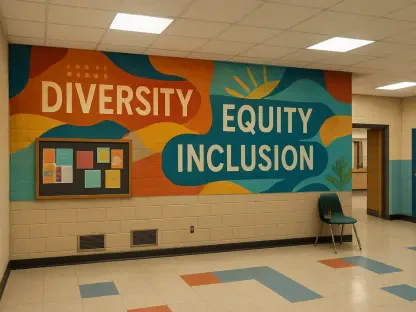In a world where technology increasingly defines how students learn and interact, a groundbreaking collaboration between a leading cyber safety brand and a global education technology provider has emerged to address the urgent need for responsible digital engagement. Announced in Charlotte, NC, on September 18, this partnership focuses on integrating cyber safety expertise into a comprehensive Digital Citizenship Initiative, specifically targeting the safe use of Artificial Intelligence (AI) among students and educators. As AI becomes not just a tool for academic advancement but also a source of emotional support for many young people, the risks tied to its unchecked use grow more apparent. This initiative seeks to equip the next generation with the knowledge and skills to navigate the complexities of the digital landscape confidently, ensuring that innovation does not come at the expense of safety or privacy.
The Urgency of Digital Citizenship in Education
Addressing Emerging Risks
The dual role of AI in students’ lives presents both remarkable opportunities and significant challenges that demand immediate attention in the educational sphere. Research from a recent Cyber Safety Insights Report on Connected Kids reveals that 2 in 5 U.S. children turn to AI for emotional companionship, a trend that raises critical questions about the potential for over-reliance on technology for personal support. This reliance, while innovative, can blur the lines between healthy interaction and dependency, leaving young users vulnerable to emotional and psychological risks if not properly guided. Educators and parents alike are increasingly concerned about how to balance these interactions with real-world connections, highlighting the need for structured education on digital boundaries.
Beyond emotional dependencies, the digital environment harbors more tangible threats that impact a significant portion of young internet users across the country. Cyberbullying, for instance, affects nearly 1 in 4 U.S. kids, creating hostile online spaces that can have lasting effects on mental health and academic performance, as detailed in the white paper Risks and Resilience: Why Digital Citizenship Matters in K12 Education. Additionally, issues of online privacy and the permanence of digital footprints pose persistent dangers, with many students unaware of how their data can be misused or exposed. These multifaceted risks underscore the pressing need for comprehensive digital literacy programs that address not only technological proficiency but also safety and ethical considerations in online behavior.
Bridging the AI Adoption Gap
A striking disparity in the adoption and perception of AI between students and educators reveals a critical gap that must be addressed to ensure cohesive learning environments. According to the Education Insights 2025–2026 report, two-thirds of students believe AI significantly enhances their learning experience, viewing it as a powerful tool for research and problem-solving. However, fewer than half of teachers report incorporating AI into their teaching practices, often due to a lack of familiarity or concerns about its implications. This disconnect can hinder the effective integration of technology in classrooms, leaving students to explore AI without adequate guidance and potentially exposing them to unfiltered risks.
To close this gap, targeted resources and professional development are essential for aligning the perspectives of students and educators on AI’s role in education. The forthcoming initiative plans to provide tailored content that educates teachers on leveraging AI safely while empowering students to use it responsibly. By fostering a shared understanding, the program aims to create a unified approach where technology serves as a bridge rather than a barrier in the learning process. Such efforts are vital for ensuring that both groups can harness AI’s benefits while minimizing exposure to its pitfalls, paving the way for a more balanced and secure digital classroom experience.
Innovative Solutions Through Partnership
Leveraging Combined Expertise
The strategic alliance between a cyber safety leader and a global edtech provider brings together complementary strengths to tackle the evolving challenges of digital engagement in education. With a platform that reaches 4.5 million educators and 45 million students worldwide, the edtech provider offers an unparalleled distribution network for impactful resources. Meanwhile, the cyber safety brand contributes deep expertise in protecting users from online threats and navigating AI technologies, ensuring that content is both practical and protective. Together, they are crafting standards-aligned materials, set to launch in the fourth quarter of this year, including videos and classroom activities designed to teach responsible technology use.
This collaboration builds on existing successes, such as a digital life program that has already impacted nearly 415,000 students with foundational lessons in online safety. The upcoming resources will expand on these efforts by specifically addressing AI’s unique challenges, from ethical usage to data privacy concerns. By embedding these lessons into everyday curricula, the partnership ensures that digital citizenship becomes a core component of education rather than an afterthought. This holistic approach is poised to empower students and educators alike, fostering environments where technology enhances learning without compromising security.
Expanding Impact with Industry Support
The initiative’s potential for widespread change is amplified by the involvement of additional industry partners who share a commitment to digital safety in education. Collaborators such as major telecommunications and cybersecurity firms lend further credibility and resources to the Digital Citizenship Initiative, signaling a collective recognition of the importance of safeguarding online spaces for young learners. This broad support reflects an industry-wide consensus that technology must be paired with responsibility to mitigate risks and maximize benefits, creating a unified front against the challenges of the digital age.
Moreover, the focus on quarterly content updates ensures that the resources remain relevant amid rapidly changing technological landscapes and emerging threats. Covering a range of disciplines, these updates will integrate digital safety education into various subjects, making it a seamless part of the learning experience. This dynamic approach not only keeps pace with innovation but also addresses diverse issues, from cyberbullying to AI ethics, in a structured manner. By fostering continuous learning and adaptation, the partnership lays a strong foundation for a safer digital future, reflecting on past efforts that successfully shaped a generation of informed and cautious technology users.









